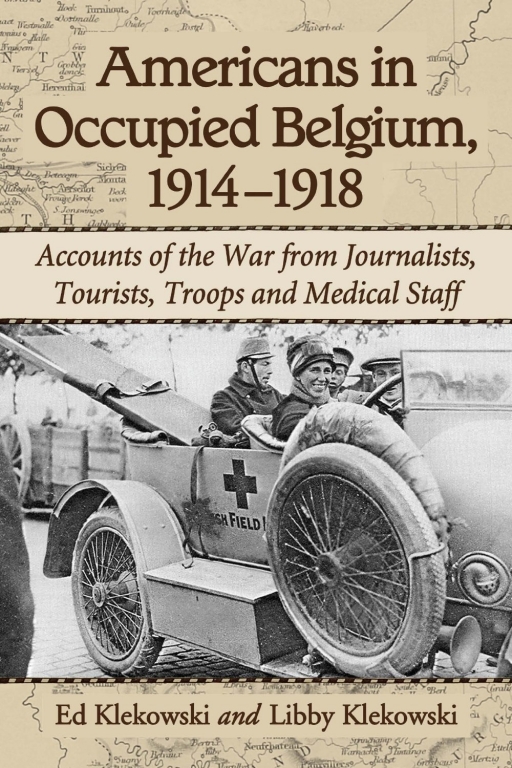On 2 October 2014, Flanders House New York hosted a book launch in celebration of Ed and Libby Klekowski’s new publication, Americans in Occupied Belgium, 1914-1918. This book tells the story of the German invasion, occupation and retreat from the perspective of Americans who were there. Centenary News writer Jillian Davidson attended and reports on the importance of the topic and the author’s story in writing the book.
On October 2nd, in its offices in The New York Times Building, Flanders House hosted a book party in honor of “Americans in Occupied Belgium, 1914-1918. Accounts of the War from Journalists, Tourists, Troops and Medical Staff.”
Authors Ed and Libby Klekowski, former biology professors at the University of Massachusetts, have previously co-written a parallel work on Americans in wartime France: “Eyewitnesses to the Great War: American Writers, Reporters, Volunteers and Soldiers in France, 1914-1918” and co-produced a television documentary “Model T’s to War: American Ambulances on the Western Front 1914-1918.”
Their new volume is the result of their six-month sojourn in the university town of Louvain. A tour of the university library “was the inspiration that ultimately led to this book.”
They learned of the library’s burning and destruction by the German Army on August 25th 1914. Surrounding the edifice today are 300 plus plaques inscribed with the names of the American schools, colleges, associations, clubs and societies that donated the funds for rebuilding the library in the 1920s. “I went to Hackensack High and my school had a plaque on it,” Ed Klekowski told the gathering at Flanders House.
“Belgium in the First World War” was, according to the opening sentence of “Americans in Occupied Belgium”, “the first country invaded, the longest occupied, and when the war finally ended, the first forgotten.” The book’s goal was accordingly to redress this displacement from American memory.
Although Americans did not enter the war until three years later, Americans had a strong presence in Belgium during the German invasion and occupation. Americans in Belgium recorded accounts of what they saw. Their eyewitness accounts form the substance of the Klekowski’s book.
The importance of Belgium as a decisive factor in bringing Great Britain into the war on August 4 is well known. Less well known is the fact that the rape of “Neutral Belgium” biased many Americans against Germany.
The Klekowskis tell their story with a great feel not only for the epic tragedy of Belgium’s history but also for its dramatic irony. On the one hand, they observe that the Imperial German Army in 1914 followed the same route that Julius Caesar took in 57 BCE, only in the opposite direction: “the Germans followed the rivers upstream from Belgium to France whereas the Romans traveled downstream, from France (Gaul) to Belgium (land of the Belgae). Both armies had to conquer the fortress city of Namur, Aduaticorum oppidum, home of the Aduatici in Roman times.” It took Caesar two weeks to take the fortified hill; it took the Germans two days.
On the other hand, they narrate, with dry wit, the dashed hopes of Brand Whitlock who arrived in Brussels in February 1914 as the new US Minister in Belgium. Brand Whitlock, the former Toledo mayor was hoping for a quiet sabbatical in Belgium where he would have the spare time to work on his American novels.
Similarly, Whitlock’s Secretary at the Legation, Hugh Gibson, arrived with false optimism: “I have never had a post where there has not been trouble; in Turkey it was the Revolution, in China it was the Boxers. I am a bird of ill omen. But now… I have the most tranquil post in Europe; nothing can happen in Brussels.”
When the German Army occupied Brussels, only Brand Whitlock and Hugh Gibson, as representatives of the most powerful neutral, remained to negotiate on behalf of the Belgian citizens. Whitlock guaranteed that the food brought by the Committee for Relief in Belgium went to Belgian citizens rather than German soldiers.
Also, when the Germans arrived in Brussels on August 20, 1914, America’s greatest war correspondent Richard Harding Davis described the scene for his American readers in an article, which was smuggled out of Brussels and which many consider to be the finest piece of writing of World War One.
Davis also managed to arrive by foot in Louvain as the city was burning. Even for so seasoned a journalist, the tragedy of Louvain represented something new. Davis conveyed this radical newness to American readers when he told them: “At Louvain it was the war upon the defenseless, war upon churches, colleges, shops of milliners and lacemakers. War was brought to the bedside and the fireside, against women harvesting in the fields and against children in wooden shoes at play in the streets.”
Proceeds of the books sold at Flanders House on October 2nd went to AFS, the American Field Service, which had its origins in 1914 with the American ambulance volunteers and continues to this present day with international student exchange programs.
AFS and Flanders House enjoy a close friendship. Quoting from the book’s opening sentence, that Belgium was the first country invaded, the longest occupied and the first forgotten, AFS spokesman assured Flanders House “Well, AFS never forgot. We are here to honor the legacy of the thousands of American volunteers. They believed in peace and we continue to promote their message: peace through cultural exchange.”
